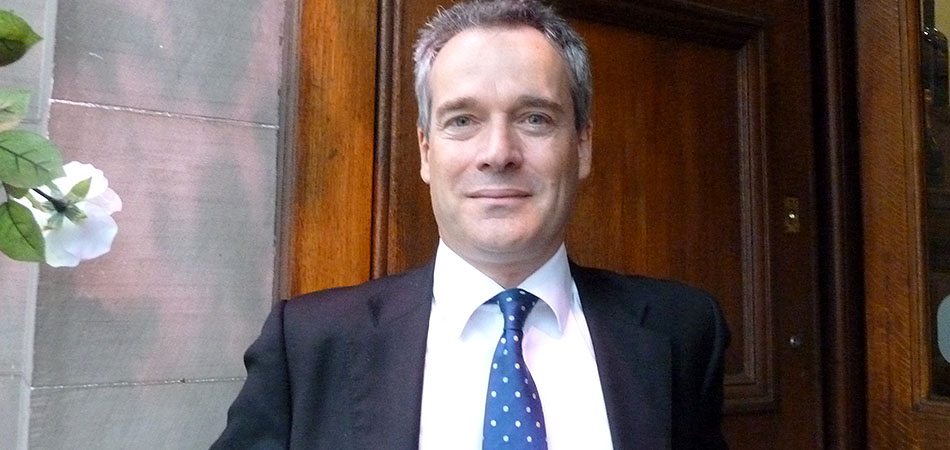
Dreamies investigation proves that the treats are irresistible to cats
The campaign by Adam&EveDDB concludes that the only cats who don’t love the pet treat are human Cats
Colin is responsible for Army Recruiting Group’s marketing services team, overseeing its network of support agencies, across high profile, multi channel communication campaigns


Colin Cook, Marketing Director, British Army, talks to Creativebrief founder Tom Holmes.
Colin is responsible for Army Recruiting Group’s marketing services team, overseeing its network of support agencies, across high profile, multi channel communication campaigns (TV, radio, digital, direct mail and field marketing), development of the Army’s recruiting website and on and off line customer management (retail network, call centre, social media).
He was previously Deputy Director of Healthcare and Planning with Scottish Government where he was responsible for NHS Scotland Corporate Strategy Social Marketing Campaigns. Prior to this he was marketing director at Royal Mail.
Colin Cook: Ultimately, I am responsible for ensuring that the Army attracts the right number high quality young people to the Regular and Territorial Army. This requires marketing across all major channels to attract initial interest, provide potential candidates with the information they need to make decisions and provide an excellent customer experience across our digital, social media, phone and retail channels.
Colin Cook: Working in the Army has been a real high point because I’ve learned so much about leadership from those who have tested themselves in some of the most demanding environments. And I hope that I’ve added something to them, by helping to put customer insight at the heart of decision making and embracing the potential of digital communications in changing the way in which we work. Looking back, I would say that my career highlights have been those occasions when I’ve been involved in delivering change. Whether it’s work in the Scottish Government around the smoking ban, the campaigns we delivered in Royal Mail to help prepare the business for greater competition or some of the partnerships and new products I’ve been involved with, it always comes down to the ability to make a difference.
Colin Cook: Recruiting is a fascinating sector because it relies upon things like networking, information exchange and good customer management, all of which are being transformed by digital communications. Many recruiting businesses have been ahead of the game in the shift to digital and social media, but the challenge we all face is transforming the way our businesses are structured and run in order that we can make the most of the opportunities that new media give us. It’s no good building talent pools if you aren’t structured to deliver engaging content that can keep people interested in your organisation. We are going to have to re-write the marketing rules around partnerships, integration and customer management. I believe that the recruitment sector is going to be at the cutting edge of this over the next 12 months.
Colin Cook: Our last two campaigns. The use of gaming technology within “Start Thinking Soldier” to maintain relationships with young people and help them build interest in the Army in a way, and at a speed, that suits them rather than our own internal ways of working. I think that campaign is a great example of how to integrate TV, digital and experiential media and a powerful reminder that all three have a future as long as they are planned and executed with a singular focus on the customer.
I have to say that I also have a soft spot for the follow up “Whiteboard” campaign. Not only was it extremely successful for us in terms of cost per acquisition, the focus it put on the quality of Army learning has really advanced the process of building our employer brand.
Colin Cook: It’s going to be exciting. We are going to see innovative partnerships across and within existing channels, the continuing rise of trusted content from individuals rather than traditional titles and an increasing focus on self owned media. A good media agency is going to be more important than ever, because a good knowledge of the changes in the landscape and the ability to spot new opportunities, build partnerships and create new channels are now an essential part of the creative process.
Colin Cook: I want to use the best agency I can for each discipline. There is no reason why these can’t be located within a single agency or group of agencies, but agency innovators are often attracted by independence and it takes time for the integrated agencies to catch up. This won’t change until we re-write the traditional rules about agency – client relationships. I want to see new forms of inter agency partnerships and new ways of integrating client departments with agency teams.
Colin Cook: Not consciously but, of course, awards do help to build brands and reputations.
Colin Cook: Like most people in our industry, it’s the constant challenge of doing more for less. In an environment in which client budgets are being cut and agency margins are being squeezed, you need to be mature enough to recognise the commercial pressures on both parties and come up with realistic marketing solutions. In these circumstances, I need to work with agencies that are prepared to take risks and challenge conventional ways of working, even if this requires them to accept that they might not always be best placed to deliver a particular component of a campaign.
Colin Cook: I’ve never been one for making unnecessary changes. Typically, I only look to change an agency if I believe that they lack the skills that I need to meet my business objectives. I don’t believe that I have ever changed an agency, or indeed sought a change within an agency account team, because of a clash of personalities. When I bring in an agency, or any form of external assistance, I do so because they can bring something that isn’t available to me in-house…and that’s an issue of expertise not personality.
Colin Cook: Through the trade press, social networks and by talking to people I trust. If I hear about an agency that’s breaking new ground, I will happily go and find out about them, even if I am not in a position to work with them in the short term. They will usually spare the time to talk about their work, even when they know there are no immediate business prospects from the meeting. It’s a great way of pushing yourself and challenging your own thinking.
Colin Cook: Many years ago, but at that time the business model of intermediaries didn’t really add value to the procurement process. Technology is allowing new models to emerge and creating intermediaries who can add value – so it’s an exciting time. Trusted sources of information are going to be vital as we source from further afield and stitch partnerships of different agencies or disciplines together.
Colin Cook: We all know the flaws in the traditional pitching system, but it does have the virtue of being relatively quick and transparent. There are some interesting developments in terms of crowd sourcing, but I’m not convinced that we have found an alternative process for identifying longer term strategic partners.
Colin Cook: Our strategy on pitching is dictated largely by procurement legislation and pitching remains the established mechanism for ensuring fair and open competition.
Colin Cook: Think about it like a marketer would and give me a reason to use you that reflects the way in which my organisation thinks.
Too few agencies have a clear idea of why they are different – or if they do, it’s a fairly flimsy creative proposition, rather than something in their DNA that they are able to reflect in the pitch they make to potential clients. There’s an old business anecdote about Pepsi finally securing the Burger King Account by changing tack and focussing on the fact that they were both brands attempting to supplant a dominant market leader.
It depresses me that agencies try and fight pitches on the same ground, rather than majoring on their point of difference. In an industry where the old certainties have crumbled away, it’s a self defeating strategy.
Looks like you need to create a Creativebrief account to perform this action.
Create account Sign inLooks like you need to create a Creativebrief account to perform this action.
Create account Sign in